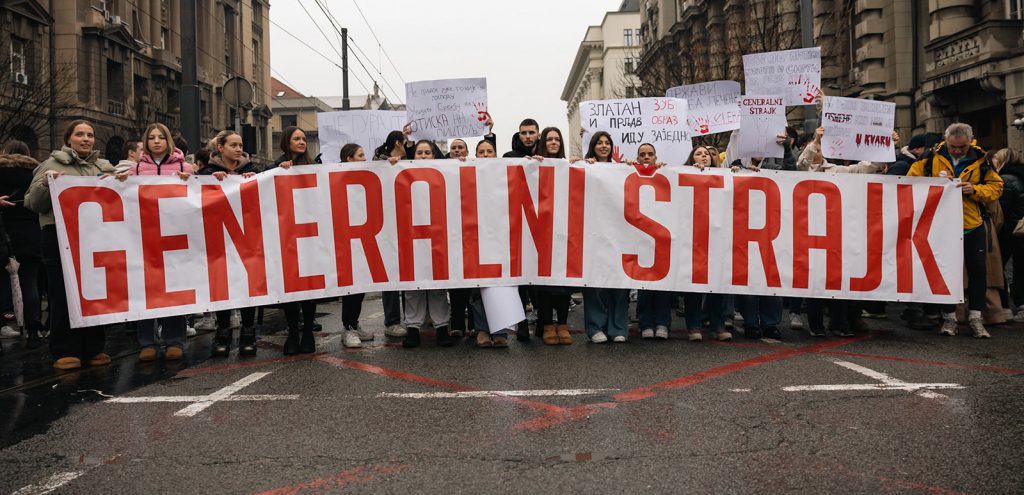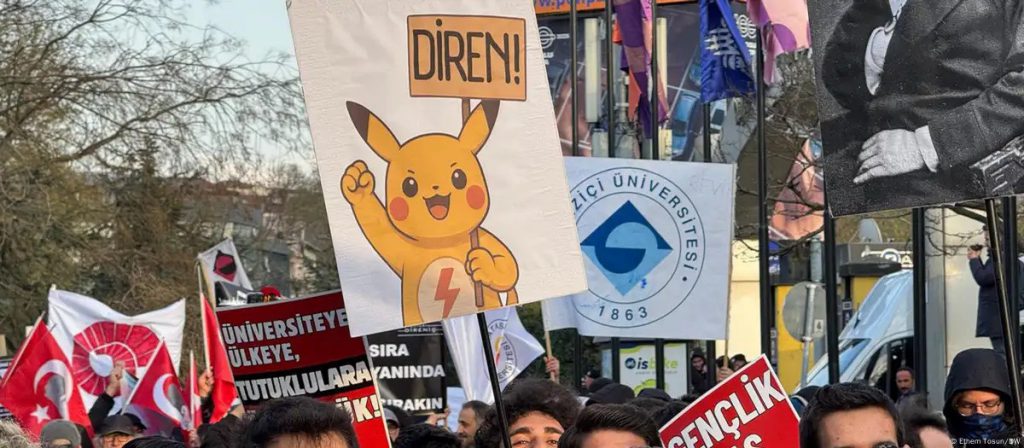Ecem Nazlı Üçok explores how student protests in Turkey, Serbia, and Georgia reflect more than isolated unrest — they reveal a transnational wave of political mourning, democratic erosion, and Gen Z-led resistance. In the face of authoritarianism, students are not just reacting — they are reimagining the future
Waves of mass protests are sweeping across Georgia, Serbia — and, since 19 March, across Turkey. These mobilisations did not come out of nowhere. They are responses to years of political erosion — rights dismantled piece by piece — resulting in collective rage. What links these geographically distant movements is grief — a political mourning that galvanises transnational resistance.
In Georgia, Serbia, and Turkey, deep political mourning is unfolding. Prolonged demonstrations in Georgia in 2023–2024, and now in 2025, have protested the government’s pro-Russian leanings and its foreign agent law. In Serbia, students say the tragic collapse of the Novi Sad railway station, which killed 15 people, was the final straw. In Turkey, grief over the arrest of opposition figures and the erosion of democracy, reflects not just immediate losses, but years' worth of mourning. Political mourning in Turkey began long before Istanbul Mayor Ekrem İmamoğlu’s arrest. Indeed, it has been mounting since the Gezi Park protests in 2013, the government’s failed response to the 2023 earthquake, and the deadly fire at Kartalkaya ski resort in January 2025.
The fight against the rise of authoritarianism and the spread of government corruption are shared struggles that demand transnational solidarity
These converging uprisings reveal how the problem is not isolated, but systemic and global. We should no longer see the rise of authoritarianism and the spread of government corruption as disparate national events, but as shared struggles that demand transnational solidarity. While authoritarian leaders build transnational alliances, the people resist them. As democratic institutions fail or erode, it is not the powerful or the privileged who are fighting to preserve democracy — it's the people who have the least of it.
Political mourning is societal grief in response to losses caused by political decisions; not just loss of lives, but of rights, dignity, and belief in justice. It is the emotional reaction to losses, inflicted by those in power, that shatter individual lives and the social contract.
When people lose faith in the rule of law, they lose faith that their society is fair, and safe. But mourning is not a static state. People often experience affective dissonance: an emotional contradiction between the world they believe in, and the one they live in. Political dissonance, too, arises from the tension between belief and experience.
In Turkey, Georgia and Serbia, Gen-Z students are experiencing this powerfully. The dissonance between their imagined futures and lived reality has become unbearable. But this hasn’t led to apathy or resignation. Instead, it is generating transnational resistance.
Many young protesters were raised in societies that promised democracy, but delivered repression. Mourning has manifested in a refusal to stay silent, normalise corruption, or surrender their futures. Many feel alienated from the state institutions that should represent and protect them. Since 2024, students in Georgia have staged boycotts protesting systemic injustices in higher education and politics. In Serbia, students have organised academic boycotts and weekly Don’t Buy days targeting government corruption. Inspired by their Serbian counterparts, students in Turkey are organising similar boycott initiatives, and refusing to shop on designated weekdays.
For many young protesters, mourning has manifested in a refusal to stay silent, normalise corruption, or surrender their futures
The connection between students in Turkey and Serbia was cemented in an open letter shared by Serbia's Studenti u Blokadi movement. Expressing solidarity with Turkish students, it read:
'Your courage and determination are inspiring us. Student-led movements are the most important driving force for meaningful societal change. Whatever the borders between Serbia and Turkey, we share the same ideals: a state based on the rule of law, and a society that truly listens to the voices of its youth. This is the foundation of a better future. You are not alone. Let us stand shoulder to shoulder.'

What can these mobilisations tell us about the future of resistance? First, they show that political grief, if acknowledged and shared, can become a catalyst for action. Second, they suggest that despite isolation, people are not alone in their struggles. As students occupy universities and reclaim public space, they are also reclaiming politics as a domain of hope and care. In the face of transnational authoritarianism, a transnational resistance is not only possible — it is already happening. It emerges from mourning, grows through dissonance, and takes shape in resistance.
Transnational resistance emerges from mourning, grows through dissonance, and takes shape in resistance
This moment demands more than observation. It requires a politics of listening, of mourning together, and of organising across national lines. The students occupying universities in Belgrade, Tbilisi and Istanbul are not simply demanding reforms — they are mourning stolen futures, and in that mourning, creating new ones.
These students remind us that democracy — or whatever fragments of it remain — is not a gift, but a something that must be fought for. And often, it is the very people most ignored or dismissed by the system — young people, students, women, queers, migrants — who take up this struggle with the most clarity, creativity, and courage. In the shadow of authoritarianism, a new kind of political subjectivity is forming — one that grieves, disobeys, and imagines.

As one student from Boğaziçi University said:
'There’s nothing left to lose — nothing could be worse than this. We know exactly what we’ve lost, and when hope for solidarity appears, we must be there. We don’t have time to waste. As we say, we’re standing on the edge of all possibilities.'